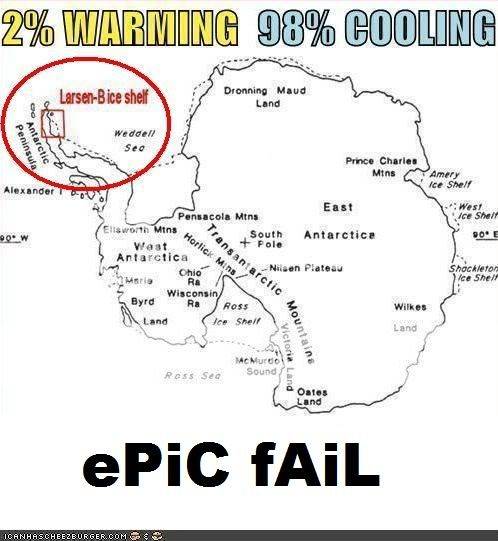Old Rocks
Diamond Member
Interesting. Moving lakes in Antarctica.
Mystery of the moving Antarctic lakes - environment - 14 January 2012 - New Scientist
RIVERS and mountains can move given enough time, but they don't normally move half a kilometre every year. Yet that is exactly what is happening to a bizarre group of Antarctic lakes. And the lakes seem to be moving far faster than the ice shelf on which they sit.
The 11 lakes are on the edge of the George VI ice shelf, a banana-shaped sheet of floating ice sandwiched between the Antarctic Peninsula and Alexander Island. They were first spotted in the 1970s but it was only last year that their wanderlust was identified.
Douglas MacAyeal at the University of Chicago gave undergraduate interns the "boring" job of digitising a series of satellite photographs of Antarctic lakes. One student, Claire LaBarbera, noticed that the lakes moved, relative to features on land, from year to year. "I thought, what a nice curiosity," MacAyeal says. Then he took a closer look and realised that the lakes were moving five to 10 times faster than the ice shelf, and in a different direction.
"We found a beautiful curiosity that probably exists nowhere else in the world," he says (Geophysical Research Letters, DOI: 10.1029/2011GL049970).
MacAyeal thinks the explanation lies in the unusual location of the George VI ice shelf, trapped as it is in a narrow channel between Alexander Island and the Antarctic mainland. As the ice sheet squeezes through the channel, its outer edges buckle into a series of crests and troughs. The lakes sit in the troughs. The ice shelf pushes into Alexander Island at an oblique angle, so the end of each trough tracks along the coast, dragging its lake with it.
Standing water on ice shelves is often a sign that they are close to collapse as the water can widen existing cracks in the ice.
Mystery of the moving Antarctic lakes - environment - 14 January 2012 - New Scientist
RIVERS and mountains can move given enough time, but they don't normally move half a kilometre every year. Yet that is exactly what is happening to a bizarre group of Antarctic lakes. And the lakes seem to be moving far faster than the ice shelf on which they sit.
The 11 lakes are on the edge of the George VI ice shelf, a banana-shaped sheet of floating ice sandwiched between the Antarctic Peninsula and Alexander Island. They were first spotted in the 1970s but it was only last year that their wanderlust was identified.
Douglas MacAyeal at the University of Chicago gave undergraduate interns the "boring" job of digitising a series of satellite photographs of Antarctic lakes. One student, Claire LaBarbera, noticed that the lakes moved, relative to features on land, from year to year. "I thought, what a nice curiosity," MacAyeal says. Then he took a closer look and realised that the lakes were moving five to 10 times faster than the ice shelf, and in a different direction.
"We found a beautiful curiosity that probably exists nowhere else in the world," he says (Geophysical Research Letters, DOI: 10.1029/2011GL049970).
MacAyeal thinks the explanation lies in the unusual location of the George VI ice shelf, trapped as it is in a narrow channel between Alexander Island and the Antarctic mainland. As the ice sheet squeezes through the channel, its outer edges buckle into a series of crests and troughs. The lakes sit in the troughs. The ice shelf pushes into Alexander Island at an oblique angle, so the end of each trough tracks along the coast, dragging its lake with it.
Standing water on ice shelves is often a sign that they are close to collapse as the water can widen existing cracks in the ice.













